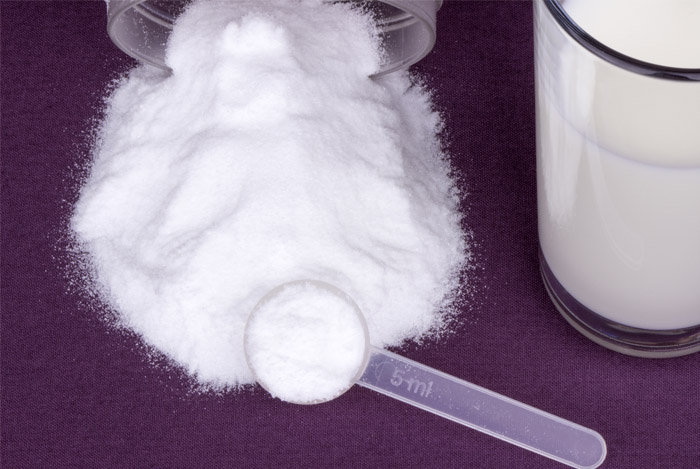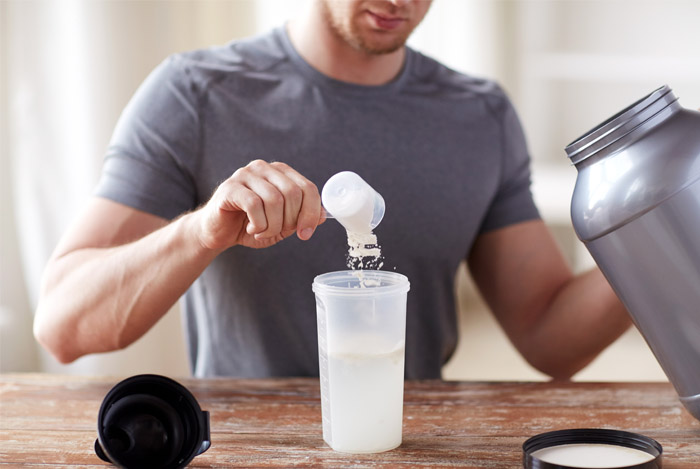Whether you just started working out last week or are an expert bodybuilder or power-lifter, you’ve heard of creatine.
It’s the most widely used supplement taken to improve athletic performance – and for good reason. Athletes everywhere buy the stuff – usually in powder form – and consume it by the bucket-load to increase the efficiency of their workouts.
Thousands of pages of scientific studies have been published on its effectiveness and relatively low risk. But, despite all the extensive scientific evidence, some people still aren’t sure about taking creatine on a regular basis to help with their workouts.
So, what is creatine? How safe is it, and what are the potential side effects?
These questions sound like the basis of a great investigation, if you ask me.
Today, we’re going to find out exactly what makes creatine the most popular workout supplement.
What is Creatine?
 Creatine is a dietary supplement used for enhancing athletic performance. It was first identified by the French chemist, Michel Eugene Chevreul, in 1832.
Creatine is a dietary supplement used for enhancing athletic performance. It was first identified by the French chemist, Michel Eugene Chevreul, in 1832.
While creatine is naturally produced by the body, it’s also regularly obtained from foods and supplements. Its most commonly available form is creatine monohydrate.
Creatine promotes the development of metabolically-active lean muscle tissue, which makes it an indirect fat burner. Basically, the more muscle you have on your body, the harder you can work in the weight room, and the more calories you’ll burn both during and after your training sessions.
How does this work?
During high-intensity exercise over a short duration, creatine is converted to a major source of fuel for the body. According to data from the University of Maryland Medical Center, creatine may boost strength, reduce fatigue, and increase muscle mass.
Creatine helps your cells retain water, which is better for athletic performance overall – but we’ll talk more on that later.
There is a bit of controversy surrounding creatine use at the most competitive levels. Some athletic organizations have questioned whether it’s ethical for athletes to take creatine to enhance their performance.
However, creatine is not currently banned by any athletic organization. Some of the main reasoning for this is that creatine is actually found naturally occurring in meat and fish. Though, the NCAA does forbid institutions from providing creatine or other muscle building supplements to their athletes.
Creatine may even have other uses outside of being a fitness supplement. It’s being studied for use in a number of diseases including Parkinson’s and depression. Because of the way it interacts with muscle tissue, it could be useful for individuals with muscular dystrophy. There’s even evidence that creatine may aid in boosting memory!
So, now that you know what creatine is, let’s find out if you should take it yourself.
Why You Should Be Taking Creatine for Your Workout
 Put simply, you should take creatine because the experts say so.
Put simply, you should take creatine because the experts say so.
Jose Antonio, Ph.D., professor at Nova Southeastern University and the CEO of the International Society of Sports Nutrition is one of those experts. He says:
“Creatine serves as a fuel source for rapid exercise through increased phosocreatine (PCr) stores. To date, creatine is clearly the single most effective dietary supplement for enchancing gains in anaerobic performance as well as increasing lean body mass and muscle fiber size.”
Not only will creatine help you build muscle mass as a bodybuilder, it can also help you lose fat. Creatine helps elevate your metabolism more directly through its hydration properties. “A well-hydrated cell tends to be more metabolic,” said Dr. Antonio.
Creatine also helps muscles look fuller due to their added hydration and volumization. This has also been shown to have beneficial anabolic effects, since it increases the synthesis of protein.
The increased volume of muscles tells the cells that they have grown. As a result, muscle cells respond by increasing the production of vital proteins – or, simply put, they increase the efficiency of the protein being used.
How Should You Take Creatine?
 Creatine monohydrate is the most popular form of creatine taken by athletes and fitness fanatics. Nearly every study performed on creatine has been on creatine monohydrate in powder form, usually taken orally or intravenously.
Creatine monohydrate is the most popular form of creatine taken by athletes and fitness fanatics. Nearly every study performed on creatine has been on creatine monohydrate in powder form, usually taken orally or intravenously.
Ever since it first became a popular supplement, creatine has been applied to loads of different forms. Creatine candy and candy bars, sports drinks, creatine gum, creatine citrate, effervescent creatine, and others claim to be better than the powder form.
The truth is that there’s no data whatsoever to indicate that any of these forms of creatine increases creatine uptake to the muscle better than plain old creatine monohydrate powder. There’s no evidence that taking these other types of creatine allow you to take less supplement overall to get the same benefits because of breakdown in the stomach, greater intestinal absorption, or otherwise.
The powder, usually bought in bulk, is also the cheapest form of creatine on the market.
Research has shown that the fastest way to increase muscle creatine stores is to “load,” or take 10 to 20 grams of creatine monohydrate for 7 to 14 days. This effectively shortens the time necessary to see results from creatine.
Once muscle creatine stores are saturated, the same studies indicate that you only need to take 3 to 5 grams per day in order to maintain your levels of elevated creatine stores.
Athletes taking creatine should remember to follow these guidelines:
- You should be past puberty and involved in serious or competitive training that stands to benefit from creatine supplementation.
- You should maintain a well-balanced diet.
- You should understand all the potential benefits and potential side effects of creatine supplementation.
- If you’re a child, you should seek parent approval before taking creatine.
- If at all possible, your creatine use should be supervised by trainers, coaches, or a physician.
- Take only quality supplements from well-regarded providers – that means no sketchy websites.
- You should never exceed recommended dosages.
If you follow these guidelines, you should be on the path to a stronger, healthier-looking physique. But now that I’ve got you interested, I bet you’re curious about what kind of side-effects creatine might have.
Are There Any Side-Effects to Taking Creatine?
 According to Quinnipiac University, the most consistently reported side effect of creatine has been weight gain. The reason for this is that creatine increases the amount of water stored in your muscles, which causes the body to retain more water.
According to Quinnipiac University, the most consistently reported side effect of creatine has been weight gain. The reason for this is that creatine increases the amount of water stored in your muscles, which causes the body to retain more water.
The average weight gain you’ll face while taking creatine is around 1 to 3 pounds during the first week of use. The more lean muscle mass you have on your body, the more water you may retain – so there’s a chance you’ll gain more than the average.
A product called creatine ethyl-ester (CEE) was created and marketed as “nonbloating.” Manufacturers claimed it wouldn’t cause the typical water weight gain that resulted from creatine monohydrate.
However, if it’s effectiveness you’re looking for, CEE may not be as effective as regular creatine monohydrate. A study published in the Journal of the International Society of Sports Nutrition in February 2009 reached the conclusion that CEE wasn’t as effective as creatine monohydrate at improving muscle mass, strength, power, and overall body composition.
There is some data that suggests creatine may increase the rate of balding in men with male pattern baldness, though the studies have not been replicated. Researchers say it may only apply to men who have a family history of or already present receding hairlines because of a “significant genetic component for hair loss in male youth.”
The reason for this may be because of the androgen and testosterone metabolite known as dihydrotestosterone, which seems to be a main player in male pattern baldness. Through the enzyme 5-alpha reductase, testosterone converts into the more potent androgen, DHT, and the results are noted primarily in the scalp.
But overall, recent findings have concluded that there “appears to be no strong scientific evidence to support any adverse effects, but it should be noted that there have been no studies to date that address the issue of long-term [creatine] usage.”
Remember Dr. Antonio? As to whether creatine is safe, he said:
“Creatine is perhaps THE most studied ergogenic aid in history. And the science clearly suggests that there are no harmful side effects of creatine supplementation. There is no evidence that is causes muscle tears, harms the kidneys, causes dehydration or myriad other silly myths. If these side effects occur, show me the science!”
That sounds pretty convincing to me.
Final Thoughts
 There you have it, folks. If you want a safe, proven effective supplement to help you pull off that extra push-up, then you should consider taking creatine.
There you have it, folks. If you want a safe, proven effective supplement to help you pull off that extra push-up, then you should consider taking creatine.
The most important thing you should remember while taking creatine is to drink plenty of fluids. That way, you won’t have to worry about the risk of dehydration.
But by fluids, I don’t mean caffeine or any other diuretics. Those drinks may increase your risk of dehydration even further. So, stick to water or other approved drinks for your workout.
Also, don’t think that you can buy a ton of creatine and continue living a sedentary lifestyle – also known as “sitting disease.” People are always looking for a get-fit-quick-trick to solve all their health problems so they can continue being lazy and not caring about their bodies.
No. When you take creatine, to get its benefits, you need to be active.
So, get out there and hit the gym hard. You’ll start seeing the changes in your body sooner than if you weren’t taking it. That’s what makes creatine the most popular workout supplement available.
What do you think about creatine for your workout? Have you ever tried it?
If so, share your experiences in the comments below!
The post Why is Creatine the Most Popular Workout Supplement? appeared first on Nutrition Secrets.
http://www.nutritionsecrets.com/why-is-creatine-the-most-popular-workout-supplement/
No comments:
Post a Comment